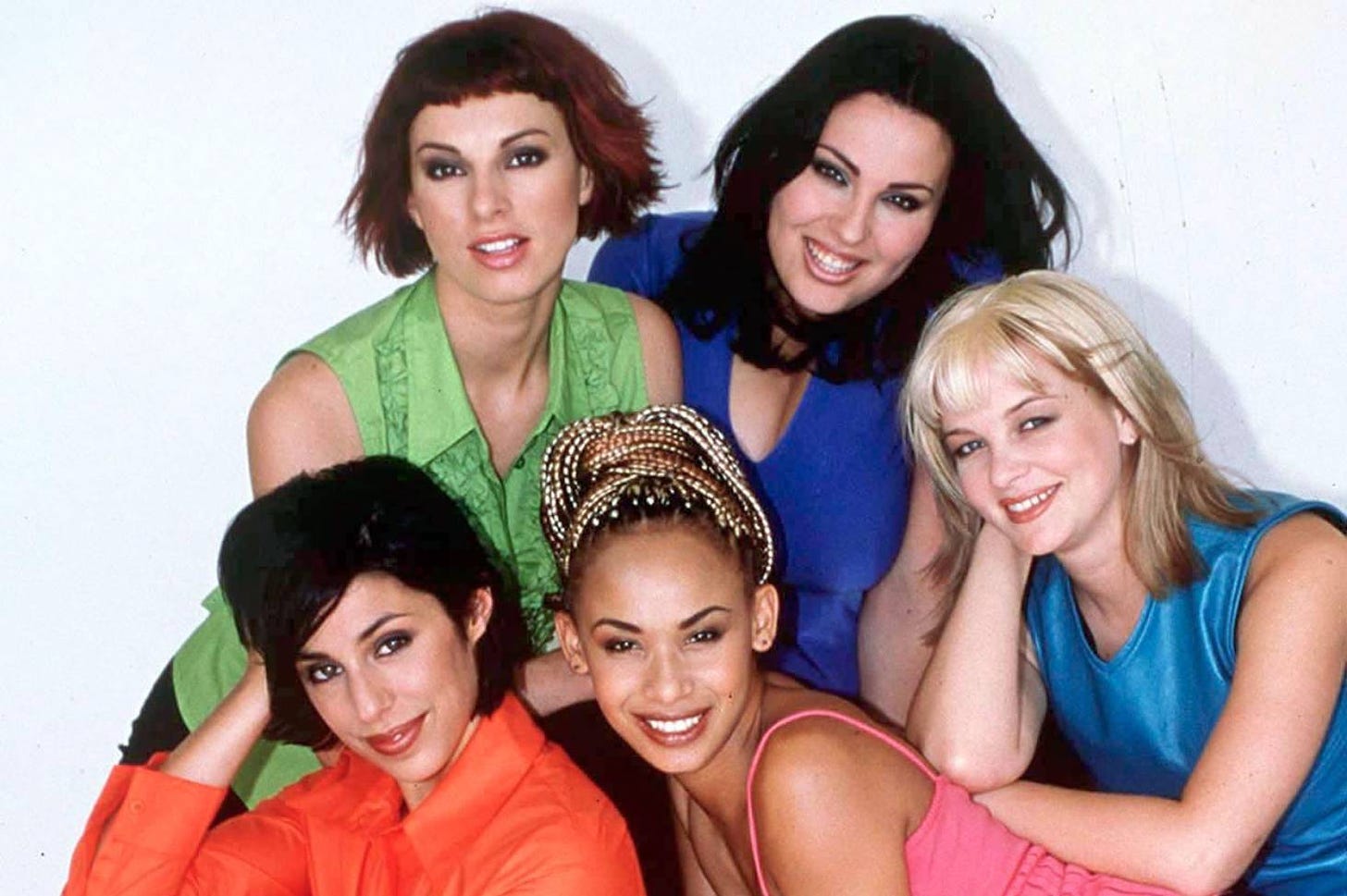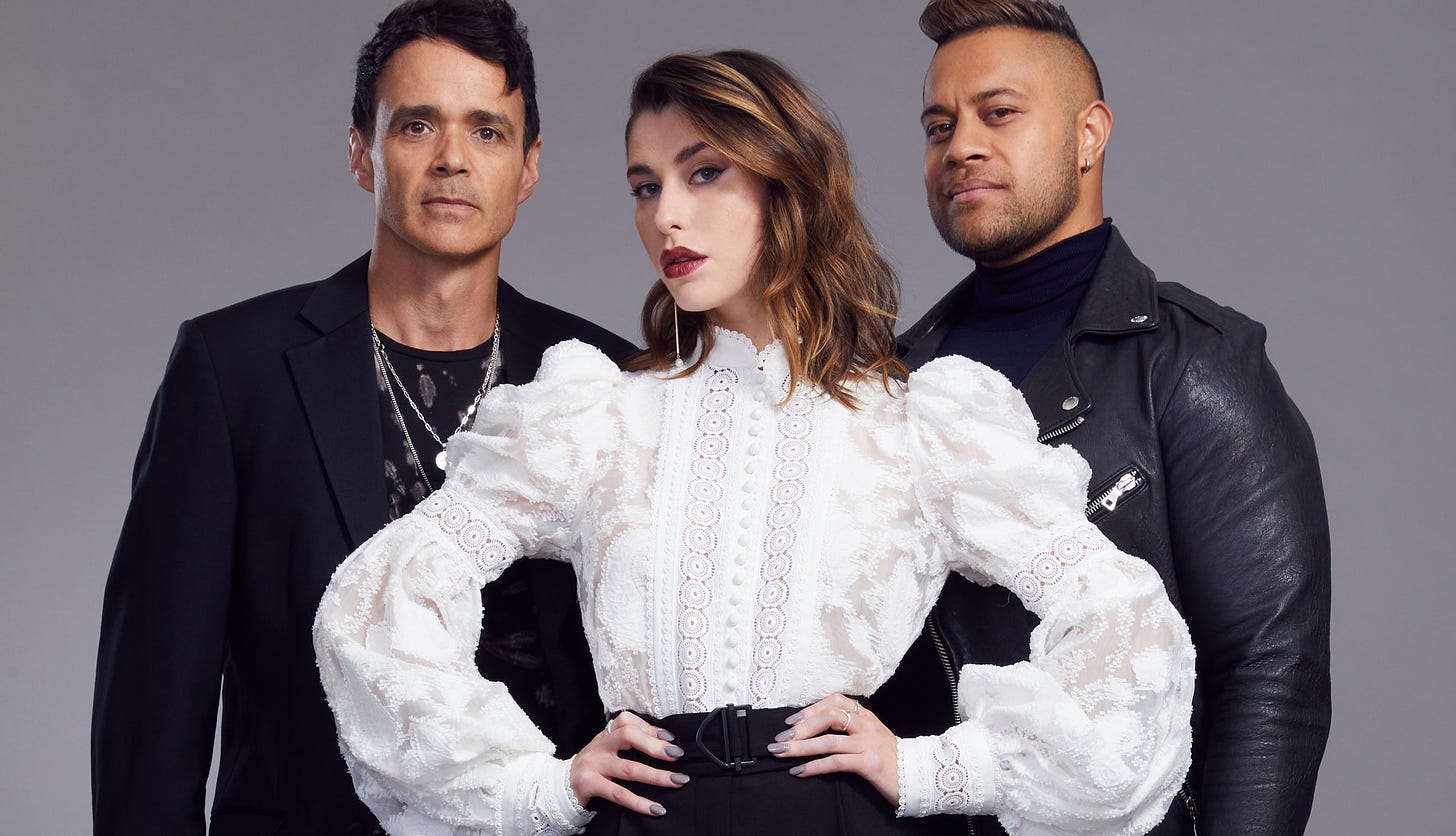TrueBliss want to know what happened to their money
They found fame, but not fortune. Where's their ca$h at?
With a new version of Popstars landing on screen tonight, the world's first made-for-TV pop group are warning of the hidden dangers of reality TV superstardom. I asked Megan Alatini and Erika Takacs about life in the whirlwind that was TrueBliss, and how they feel about it all these days. Let’s go…
Five young faces would beam from giant billboards, newspaper front pages and magazine racks.
Their songs would play constantly on the radio, their music videos rotated heavily on TV.
When Popstars debuted, the coverage started immediately. For a full year, it didn't stop.
“We were in people's faces 24/7,” says Megan Alatini, who, along with Erika Takacs, Joe Cotton, Keri Harper and Carly Binding, formed TrueBliss, the world's first made-for-TV pop group.
Popstars debuted in 1999, a show that searched for and found the five members of TrueBliss. Fame was instant.
“The very next day after our first episode aired ... we walked down to St Kevin's Arcade,” says Alatini.
“These people came running up to us saying, ‘Oh my god - you guys are the girls from that show Popstars. Can we have your autograph?’”
At first, Alatini struggled to understand it. She asked the autograph hunters: “Why?”
She soon found out. The group's popularity exploded.
“It just catapulted,” says Alatini. “It got bigger and bigger.”
They had a chartered plane with the group's name on it. Every show sold out. Fans would surround TrueBliss wherever they went. At one Bledisloe Cup match, they proved to be a bigger drawcard than the All Blacks, mobbed by “hundreds, then thousands” of people.
“They (the All Blacks) got annoyed at us,” says Alatini.
It was decided that the group needed bodyguards.
“We had big burly men who looked like they might rip your head off and jam it down your throat,” says Takacs.
It happened so fast. Popstars put TrueBliss together and let the country watch them go through the highs and lows of a full-length music career in just a few months.
Cameras captured their every move - from learning dance routines to dealing with record labels to behind-the-scenes fights between the group's members. They wore sequins and struggled with stalkers. One young lad spent the day walking from Orewa to their Britomart Hotel base to catch a glimpse of his favourite member - Harper, at 18 the group’s youngest member - before turning around and walking home again.
“It was weird,” admits Alatini. She believed the group's stalkers were harmless - but “they'd be at every show”.
Back then, there was no precedent for any of this. Popstars was a world-first, a phenomenon that set off a wave of talent-based TV that's still going on today. The format was sold to 50 different countries, and morphed into American Idol, and The X Factor. Without it, there'd be no Simon Cowell, One Direction, Kelly Clarkson, or - ahem - William Hung.
TrueBliss were forced to adapt quickly, learning reality TV's ropes on the fly. There was no instant reaction from social media, because Facebook, Instagram and Twitter didn't exist.
“It was only when you watched the episode back you'd go, ‘Oh my god I wish I hadn't said that,’” says Alatini. “It was the most bizarre feeling ever, and for that to become the norm, you almost forgot the camera was there.”
From the outside, it seemed like a supercharged pop dream come true. Once Popstars finished, TrueBliss immediately released their first single, Tonight. It spent two weeks at No 1. Their debut album Dream, recorded in a matter of weeks, followed suit. They embarked on a nationwide tour, playing in any venue that would have them. They sold out the Auckland Town Hall, played on the back of a meat truck in Dunedin. TrueBliss would perform every song in their repertoire, and thousands of people would scream the lyrics back at them.
“We performed in the biggest venues available to us ... we did two shows a day,” says Alatini.
Takacs says they felt like the Spice Girls. “En masse we were quite a force. This was the late 90s, everything was PVC, sequins, everything was shiny, big hair and crazy makeup. We did stand out.”
Was it really true bliss? More like false promises. Twenty-two years on, Alatini and Takacs have an admission to make. Their success was a mirage. It was all make-believe. It didn't last, because it couldn't.
“The fame didn't come because we were incredibly amazing,” says Alatini. “The fame came from being in people's faces 24-7. The glam, if it ever appeared like that, it wasn't our reality.”
Takacs agrees. “The glam was borrowed and given back at the end of the day.”
At the time they became world-famous in New Zealand, Cotton was sleeping on a producer's couch, selling CDs at a Sounds music store. Takacs worked in retail at a Newmarket shoe store, and Harper was a part-time graphic designer.
Alatini, who was also raising a toddler with her partner, then All Black Pita Alatini, braided hair in the family business. Money? They had hit songs, a smash album and a sold-out tour. TrueBliss assumed their cash was coming.
“A career usually comes with compensation,” says Alatini. “I thought musicians and people on TV were rich and famous, not just famous.”
The lack of money started stressing them out.
“We'd get together and go, 'Are you getting paid? What's happening with that?’,” says Alatini.
They signed an agreement to pay themselves a small weekly amount, a loan based on future earnings, believing there’d be a much bigger payout coming once the album and tour earnings came through. It never did, and it became the problem that saw TrueBliss break up just a year after it all kicked off.
“The challenge of working out where the trust and the loyalty and the support was, that was really marred by that experience,” says Alatini. “We were in it for the love of the music and each other. We didn't want to be battling management and record companies.”
Ask them if they know what happened to the money, and Alatini and Takacs give each other a knowing glance.
“We think we know why,” says Takacs.
Alatini agrees: “Let's just say it didn't go to us.”
Takacs believes the group was milked for all it was worth.
“Nobody really knew what we were getting into and where it was going to go, but there were some people who were wiser to the industry than we were and went, ‘Aha, we've got something good here, they're none the wiser, we'll just keep moving along, and it will work out for us, and we'll sweep it under the carpet.’”
Alatini says the group sought guidance, but couldn't get the support they needed.
“That (request) was intercepted by management, and it all got corrupted from there.”
A second season of Popstars begins screening tonight, 22 years after the original. Kimbra, Vince Harder and Zed's Nathan King are the show's panelists, and they'll be focusing on fostering genuine musical talent - not just good TV talent.
They'll be supported by a who's-who of the New Zealand music industry - including Takacs and Alatini. That's an experience TrueBliss wish they had, and they want their journey to act as a warning for those taking part.
“We can at least share that part of the story ... to be that support and guiding light for others. Young people have that information and access to support so much more than what we did. We can just say, ‘Hey, walk into this with your eyes a little bit wider open than what ours were,’” says Alatini.
Are they bitter? No way. Sitting in a small TVNZ boardroom, Alatini and Takacs are beaming, more than happy to share their TrueBliss story for the umpteenth time.
While Binding doesn’t take part in the group any more, Alatini, Takacs, Harper and Cotton still get together, still perform regularly, still love each other’s company, and still marvel at what they all went through together.
After all, Popstars kicked off an entire industry that's still going on today. The bad stuff? “It was just a small part of what was an incredible time,” says Alatini.
“People don't realise that all of that started here. The first in the world? What the hell? It's crazy. It's nuts.”
* Popstars screens on TVNZ 2 from Monday. This story first appeared on Stuff.co.nz.





